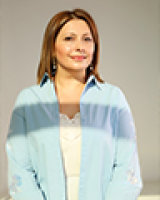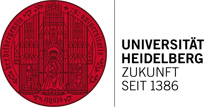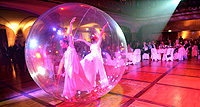“Germany is considered the most innovative country in the world”

Prof. Dr Srbuhi V. Lulukyan
Prof. Dr Srbuhi V. Lulukyan, Linguist at the Armenian State Pedagogical University in Yerevan/Armenia
In October/November 2016 Visiting Researcher at the Institute for German as a Foreign Language Philology (IDF)
When, for how long and in what position were you at Heidelberg University?
From 1 October to 30 November 2016, I was a postdoctoral researcher at the Institute for German as a Foreign Language Philology (IDF) at Heidelberg University with a scholarship from the German Academic Exchange Service (DAAD). The overarching theme of the research project under the supervision of Prof. Dr Christiane von Stutterheim was "The Development of Communicative Language Competence in the Teaching of German as a Foreign Language".
Why did you choose Heidelberg University?
I was attracted to Heidelberg University being the oldest university in today's Germany and one of the most research-intensive in Europe. At the time, I studied the university's history and diverse research offerings in detail and decided to do a research project at the IDF. Ruperto Carola was able to give me a good opportunity to work with colleagues from all over the world. I would like to thank the DAAD, the Welcome Centre for International Scholars at Heidelberg University and the Dean's Office of the Faculty of Modern Languages and Literature as well as Dr Martina Engelbrecht from the IDF for all the support during my research stay.
What experience did you gain in Heidelberg?
As a lecturer in German as a Foreign Language (DaF), I have long been interested in the current didactic issue of German and have had research questions within the overarching topic of "Communicative Language Competence in DaF Teaching", which is the subject of my current teaching, research and publication activities. My research at Heidelberg University was of decisive importance for my professional advancement as well as for the goals of my further academic work. At the IDF, Prof. von Stutterheim involved me in the work of the research group and I received full support there. The colleagues assisted me in collecting materials and I was able to make use of the rich selection of specialist literature in the university library. The colleagues from the Department of Didactics and Language Practice advised and accompanied me, and I was also supported in the collection of materials for my academic work at the IDF.
What do you particularly like here, where do you have suggestions for improvement?
I had the opportunity to exchange ideas with German colleagues, to present the results of my research and to learn about experiences and problem areas in foreign language teaching in Germany as well as to identify my own problems. I also took the opportunity to talk to teachers at Heidelberg schools about current issues in German teaching. This gave me the great opportunity to expand my methodological-didactic training skills, to update constructive and innovative German teaching and to acquire even more confidence in German as a language of instruction. I benefited from exchange opportunities and discussions on problem areas in the field of DaF teaching and gained good experience. I was and still am deeply impressed by the events that the Welcome Centre organised and carried out: A trip to Strasbourg not only allowed me to discover a beautiful city on the border with Germany, but it was also a nice opportunity to meet colleagues from all over the world. My daughter was also there and she still remembers this most beautiful day of our stay. In the future, I would like to contribute to cooperation and project development. It would be nice if visiting researchers from different countries would develop and carry out joint research projects and solve research problems together.
What was your further career path like after your time in Heidelberg?
I use the results of my research work, which I achieved during my stay in Germany, in my lectures at the university and in further training courses for German teachers in Armenia. In 2017, I gave a presentation on the results of my research at Heidelberg University at the International German Teachers' Conference (IDT) in Freiburg. Furthermore, I have also published two academic articles in my home country as part of my research project. In the meantime, a collection of methodological-didactic materials for student teachers in the German department has also been published.
How do you rate the German science system compared to your home country or other countries where you have already conducted research?
Germany is considered the most innovative country in the world and is one of the 20 percent of countries in which scientists are basically free to conduct research. Universities in Germany offer great opportunities for theory and practice, analysis and constructive discussion. Teaching and research, support for continuing education and international cooperation provide impetus for innovation. The system is constantly being modernised and offers students and academics a wide range of opportunities for independent work and international cooperation. Different funding programmes support innovative projects.
How important do you consider international exchange in science?
In my research, it is of great importance to exchange thoughts with German colleagues, to know research results, experiences and problem areas of foreign language teaching in Germany and to present my own problems. During my stay in Heidelberg, I was not only able to broaden my methodological-didactic and country-specific competences, but I also exchanged views on learning traditions and habits, cultural and language relations, institutional conditions, media equipment and teacher training.
Do you recommend a research stay at Heidelberg University to your students or within your academic network?
The land of poets and thinkers attracts many students and scholars. I recommend a stay here to my students and all interested colleagues who want to develop themselves further, pursue a steep career and exchange ideas with foreign students and first-class academics!

